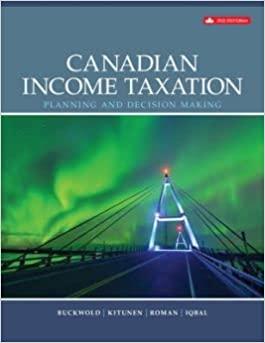Question
Remo has asked your advice on whether he should incorporate investments he owns to a new corporation that would be a CCPC. He would be
Remo has asked your advice on whether he should incorporate investments he owns to a new corporation that would be a CCPC. He would be the sole shareholder. He notes that while the investments will not earn any investment income in the near future, they are expected to increase in value by $100,000. He wonders if it would be preferable that a future capital gain of $100,000 be realized by a corporation with after-tax funds distributed to him as dividends. The alternative is to realize the capital gain personally. Any capital gain would not be eligible for the capital gains deduction.
Remo is in the top tax bracket in Ontario with his marginal rate being 51%. He also noted that all capital gains recognized by the corporation would be paid out to him personally and not left in the corporation. The Ontario corporate income tax rate for non-SBD income is 12%. Remo's personal tax rate on non-eligible dividends (after factoring in gross up and dividend tax credit) is: 43.65%.
Note: Combined federal and provincial income tax rate for investment income is as follows: 38% basic federal corporate tax - 10% federal abatement +10.67% ART + 12% provincial tax = 50.67%.
Personal:
- Capital gain: $100,000
- Taxable capital gain: $
- Personal taxes: $ (ENTER AS NEGATIVE USING BRACKETS)
- After-tax cash retention: $
Using a corporation:
- Capital gain: $100,000
- Taxable capital gain: $
- Corporate taxes: $ (ENTER AS NEGATIVE USING BRACKETS)
- Capital Dividend Paid to Remo: $
- Cash available for non-eligible dividend: $
- RDTOH available for non-eligible dividend: $ ROUND TO NEAREST WHOLE NUMBER
- TOTAL NON-ELIGIBLE DIVIDEND PAID to Remo (Cash + RDTOH): $
After tax retention using corporation and paying all dividends to Remo:
- Tax-free capital dividend received: $
- Non-eligible dividend received: $
- Tax payable on non-eligible dividend: $ ROUND TO NEAREST WHOLE NUMBER, ENTER AS NEGATIVE USING BRACKETS
- After-tax retention using a corporation: $
Which is better, personally or via a corporation paying all after-tax profits out personally with a non-eligible dividend (enter your answer as either Personal or Corporate):
- Personal or Corporate?
Step by Step Solution
There are 3 Steps involved in it
Step: 1
Analysis of Personal vs Corporate Option for Capital Gain Lets analyze both options considering the ...
Get Instant Access to Expert-Tailored Solutions
See step-by-step solutions with expert insights and AI powered tools for academic success
Step: 2

Step: 3

Ace Your Homework with AI
Get the answers you need in no time with our AI-driven, step-by-step assistance
Get Started


